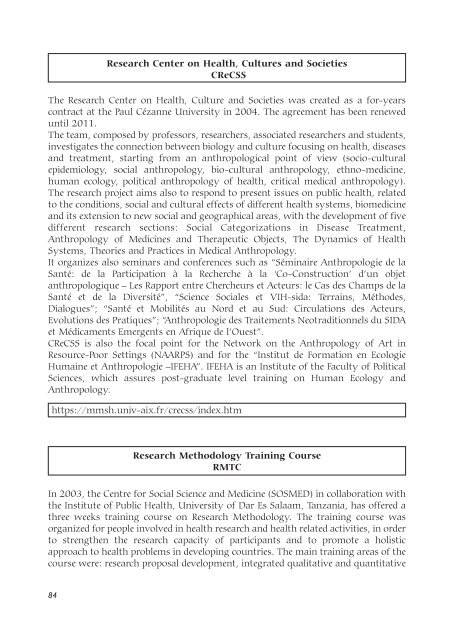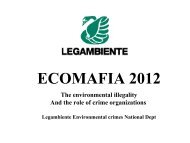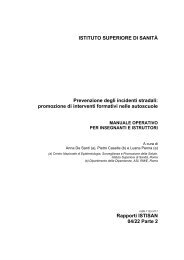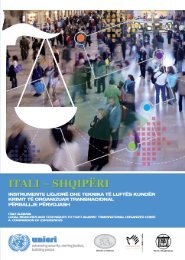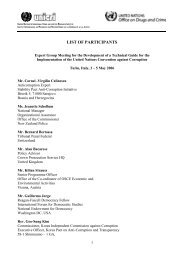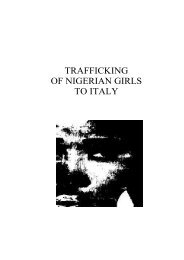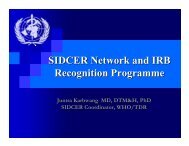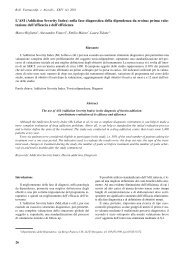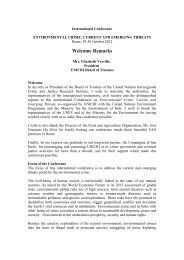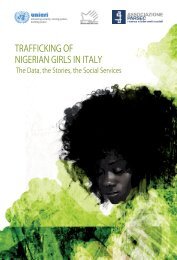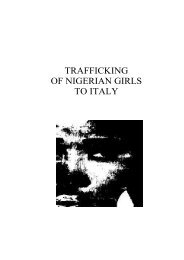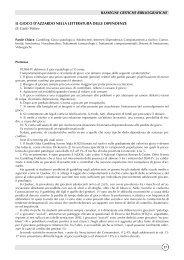Biomedical Research in Developing Countries - UNICRI
Biomedical Research in Developing Countries - UNICRI
Biomedical Research in Developing Countries - UNICRI
Create successful ePaper yourself
Turn your PDF publications into a flip-book with our unique Google optimized e-Paper software.
<strong>Research</strong> Center on Health, Cultures and Societies<br />
CReCSS<br />
The <strong>Research</strong> Center on Health, Culture and Societies was created as a for-years<br />
contract at the Paul Cézanne University <strong>in</strong> 2004. The agreement has been renewed<br />
until 2011.<br />
The team, composed by professors, researchers, associated researchers and students,<br />
<strong>in</strong>vestigates the connection between biology and culture focus<strong>in</strong>g on health, diseases<br />
and treatment, start<strong>in</strong>g from an anthropological po<strong>in</strong>t of view (socio-cultural<br />
epidemiology, social anthropology, bio-cultural anthropology, ethno-medic<strong>in</strong>e,<br />
human ecology, political anthropology of health, critical medical anthropology).<br />
The research project aims also to respond to present issues on public health, related<br />
to the conditions, social and cultural effects of different health systems, biomedic<strong>in</strong>e<br />
and its extension to new social and geographical areas, with the development of five<br />
different research sections: Social Categorizations <strong>in</strong> Disease Treatment,<br />
Anthropology of Medic<strong>in</strong>es and Therapeutic Objects, The Dynamics of Health<br />
Systems, Theories and Practices <strong>in</strong> Medical Anthropology.<br />
It organizes also sem<strong>in</strong>ars and conferences such as “Sém<strong>in</strong>aire Anthropologie de la<br />
Santé: de la Participation à la Recherche à la ‘Co-Construction’ d’un objet<br />
anthropologique – Les Rapport entre Chercheurs et Acteurs: le Cas des Champs de la<br />
Santé et de la Diversité”, “Science Sociales et VIH-sida: Terra<strong>in</strong>s, Méthodes,<br />
Dialogues”; “Santé et Mobilités au Nord et au Sud: Circulations des Acteurs,<br />
Evolutions des Pratiques”; “Anthropologie des Traitements Neotraditionnels du SIDA<br />
et Médicaments Emergents en Afrique de l’Ouest”.<br />
CReCSS is also the focal po<strong>in</strong>t for the Network on the Anthropology of Art <strong>in</strong><br />
Resource-Poor Sett<strong>in</strong>gs (NAARPS) and for the “Institut de Formation en Ecologie<br />
Huma<strong>in</strong>e et Anthropologie –IFEHA”. IFEHA is an Institute of the Faculty of Political<br />
Sciences, which assures post-graduate level tra<strong>in</strong><strong>in</strong>g on Human Ecology and<br />
Anthropology.<br />
https://mmsh.univ-aix.fr/crecss/<strong>in</strong>dex.htm<br />
<strong>Research</strong> Methodology Tra<strong>in</strong><strong>in</strong>g Course<br />
RMTC<br />
In 2003, the Centre for Social Science and Medic<strong>in</strong>e (SOSMED) <strong>in</strong> collaboration with<br />
the Institute of Public Health, University of Dar Es Salaam, Tanzania, has offered a<br />
three weeks tra<strong>in</strong><strong>in</strong>g course on <strong>Research</strong> Methodology. The tra<strong>in</strong><strong>in</strong>g course was<br />
organized for people <strong>in</strong>volved <strong>in</strong> health research and health related activities, <strong>in</strong> order<br />
to strengthen the research capacity of participants and to promote a holistic<br />
approach to health problems <strong>in</strong> develop<strong>in</strong>g countries. The ma<strong>in</strong> tra<strong>in</strong><strong>in</strong>g areas of the<br />
course were: research proposal development, <strong>in</strong>tegrated qualitative and quantitative<br />
84


